WMG News
UK closer to net-zero steel thanks to new WMG and Tata Steel partnership
More sustainable, low-carbon steel and electric vehicle batteries are the target of a new two-year technology development programme between WMG at the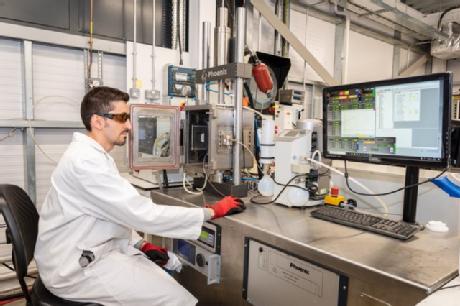 University of Warwick and Tata Steel, as part of the High Value Manufacturing Catapult.
University of Warwick and Tata Steel, as part of the High Value Manufacturing Catapult.
The two major partners will come together to focus on developing new environmentally-friendly steel grades, coatings, films, and battery structures – enabling the growth of steel application across key industrial sectors as the UK advances towards a net-zero future.
This partnership builds on the long-standing relationship between both parties and will see them collaborate to make steel cleaner, greener and more responsive to the fast-changing needs of customers across a variety of sectors.
Researchers, led by Professor Claire Davis, at WMG, University of Warwick, will be working alongside experts at Tata Steel in the UK to translate and apply outputs from the early-stage research across key UK manufacturing priority areas including advanced materials and light-weighting, electrified propulsion system applications, digital manufacturing and net-zero manufacturing including circular supply chains.
The initial research activity will be focused across five core themes: Product metallurgy; Surface state optimisation; Non-metallic coatings; Future material applications and Material forming/joining and associated characterisation.
Professor David Greenwood, CEO of the High Value Manufacturing Catapult at WMG, University of Warwick, explained, “WMG has worked with Tata Steel on projects for many years, and this partnership will see the collaboration grow across key research themes, including decarbonising the supply chain and enabling future applications of steel across zero carbon propulsion systems and transport vehicles. This activity will include identifying new collaborative relationships and developing world-class technology for the future of the UK steel industry.”
on projects for many years, and this partnership will see the collaboration grow across key research themes, including decarbonising the supply chain and enabling future applications of steel across zero carbon propulsion systems and transport vehicles. This activity will include identifying new collaborative relationships and developing world-class technology for the future of the UK steel industry.”
Dr. Sumitesh Das, Director of R&D, Tata Steel, explained: “This is a critical partnership for us to help support new product development with low carbon footprints across various market segments. It also strengthens our ongoing work including building technology capability and expertise in the UK in manufacturing.”
-ENDS-
Notes to Editors
Press Contacts:
Simmie Korotane. Media Relations, University of Warwick, Email: mailto: Simmie.korotane@warwick.ac.uk
Tim Rutter, Head of Public Relations, Tata Steel UK, M: +44 (0)7850 990755, E: mailto: tim.rutter@tatasteeleurope.com
Battery tech pioneer Britishvolt strengthens partnership with WMG, University of Warwick, to ramp up UK electric vehicle battery production
- The multi-million-pound [£] project with WMG, University of Warwick, is pioneering battery technology in the UK
- Research from WMG, University of Warwick, will help Britishvolt to ramp up the availability of batteries for electric vehicles, and other applications, in the UK and beyond
- The project is accelerating Britishvolt’s business plan to deliver a 38GWh battery Gigaplant, one of the largest industrial investments ever undertaken in the UK
- Britishvolt recently announced exciting plans for a scale-up production centre in the epicentre of the automotive industry located at Hams Hall, West Midlands, creating what it calls a “Battery Corridor” – linking the Northumberland site with the UK’s automotive heartland
- The Gigaplant will build enough cells each year for well over 300,000 electric vehicle battery packs, equivalent to [c]25% of current UK vehicle manufacture, securing Global Britain’s position on the sustainable battery production map
WMG has partnered with leading sustainable, low-carbon battery manufacturer, Britishvolt on a two-year multi-million-pound project which is pioneering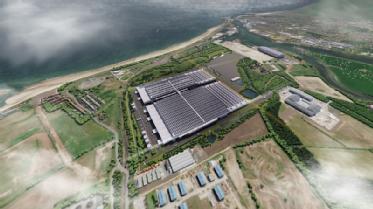 battery technology in the UK.
battery technology in the UK.
More batteries for electric vehicles will become available in the UK thanks to research from WMG, at the University of Warwick and its partnership with battery tech pioneer Britishvolt.
The project is helping Britishvolt to deliver a 38GWh battery Gigaplant, one of the largest industrial investments ever undertaken in the UK. The facility, located in the North-East of England, will quickly increase the availability of batteries required at commercial scale for the electric vehicle market – playing a key role in helping the UK reach its carbon net zero target by 2050.
Following an initial 12-month project, Britishvolt and WMG are now embarking on a two-year programme of work. WMG’s research will assist with battery cell development and optimisation including small-scale manufacturing to produce battery electrodes and cells using Britishvolt target materials sets, formulations and cell designs. These will then be tested according to Britishvolt’s agreed protocols.
Professor Dave Greenwood, CEO of the High Value Manufacturing Catapult at WMG commented: “WMG is delighted to be supporting Britishvolt as they set up large scale battery manufacturing and research facilities in the UK. This industry will be critical for the future of the UK automotive and energy sectors. WMG has been investing over the last decade in the research and development capabilities needed to help Britishvolt and other battery companies to be internationally competitive now and in the future”
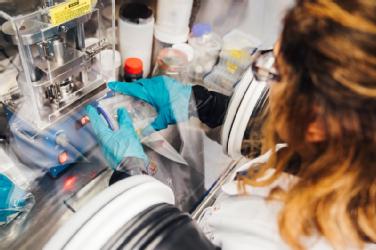 Dr Allan Paterson, Chief Technical Officer, Britishvolt, concluded: “Britishvolt are delighted to extend and expand our relationship and programme of work with WMG. The battery science, advanced materials and cell prototyping expertise and capability at WMG has directly, and positively, supported our battery technology development programme. This gives us not only an excellent basis to progress from, as we seek to scale and commercialise our technologies, but the relationship also enables Britishvolt to continue to develop our products further, as we continually strive to deliver best-in-class, market-leading, cell technologies to our customers.”
Dr Allan Paterson, Chief Technical Officer, Britishvolt, concluded: “Britishvolt are delighted to extend and expand our relationship and programme of work with WMG. The battery science, advanced materials and cell prototyping expertise and capability at WMG has directly, and positively, supported our battery technology development programme. This gives us not only an excellent basis to progress from, as we seek to scale and commercialise our technologies, but the relationship also enables Britishvolt to continue to develop our products further, as we continually strive to deliver best-in-class, market-leading, cell technologies to our customers.”
Britishvolt: Power with Purpose
The Northumberland Gigaplant – Britishvolt’s first large, full-cycle Gigaplant in the UK - will have a total capacity of over 38 Gigawatt Hours by the end of the decade and will produce enough cells far in excess of 300,000 electric vehicle battery packs per year, intended primarily for use in the automotive industry. The development is a major boost for Northumberland, and the UK, delivering around 3,000 direct skilled jobs and another 5,000-plus in the associated supply chains.
Britishvolt’s collaborations with academia, industry and private enterprise will also help transition the UK from fossil fuels to a low carbon, battery-based electric future.
The release of an official A-sample battery cell to customers, which is scheduled later in 2022, will help to further accelerate commitments.
Britishvolt recently announced that it will develop its UK battery cell scale-up facility in the West Midlands, home to the internationally renowned battery ecosystem With a budget exceeding £200m, the plan looks to create upwards of 150 highly skilled, well-paid jobs; unifying the Britishvolt Northumberland Gigaplant with a centrally located scale-up/technology hub
The Hams Hall site will spearhead new cell formats and electro chemistries to create higher performance, production ready, batteries of the future whilst helping lower cell costs for more affordable EVs, aiding mass adoption
Britishvolt is one of the fastest growing battery technology companies in Europe and globally. The company is also in discussions with the Canadian Government regarding its expansion plans in the country.
Watch Britishvolt’s Battery Research video: https://www.youtube.com/watch?v=3UlDcUjMhiE
WMG supports a national employability programme
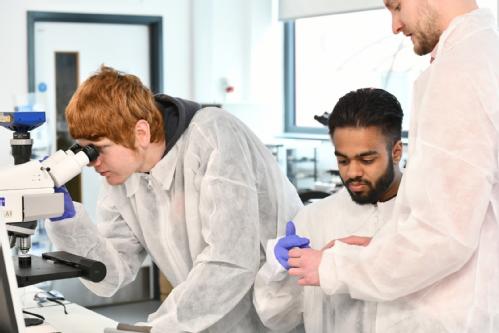 Staff from WMG, at the University of Warwick, were proud to support the EY Foundation’s Beyond Your Limits employability programme, helping care-experienced young people with their future careers.
Staff from WMG, at the University of Warwick, were proud to support the EY Foundation’s Beyond Your Limits employability programme, helping care-experienced young people with their future careers.
The new partnership between Warwick, led by the University’s Social Inclusion Group, and the EY Foundation has been made possible with funding through a UKRI Higher Education Innovation Fund.
Beyond Your Limits aims to develop key skills that are essential for helping young people reach their true potential as they take their first steps into a career, apprenticeship, or further education. A total of eight young people enrolled on the 2021/22 programme with the University of Warwick.
Part of the programme required the young people to take part in a workplace experience, so the Social Inclusion Group worked to align the young people with departments that would support their career aspirations and interests.
The Beyond Your Limits programme has been specifically designed for care-experienced young people in education, aged 16-19. On the programme they receive paid employability training, work experience placements, a personal development grant, a business mentor and progression coach.
Three of the eight students were allocated to a WMG Research Fellow, Dr Craig Carnegie, who acted as a business host, providing five and a half days of structured work experience, facility tours and opportunities to network within WMG.
Craig explained: “I created tailored individual programmes for the students; taking into account their personal interests of aerospace, manufacturing and photography. They completed the various tasks on campus during the Easter and May school holidays. This project gave them the opportunity to experience real world research and engineering, at a time when they are choosing their paths to take for their future careers.
“It was a very rewarding experience, and although the placements have now finished, I’m still available for contact if they need support with job applications, helping them to improve their employability and professional networks. They were a remarkable group of young people, and I am looking forward to seeing what they go on to achieve in the future.”
Professor Margaret Low, WMG’s Director of Outreach and Widening Participation, explained: “Craig’s contribution to this project will have made a marked impact on these young people. It is so important that universities provide role models and support to the people who will make up the workforce of the future to ensure that science and engineering roles are accessible to people from all backgrounds. Thanks to Craig’s efforts with the EY Foundation WMG has been able to further support widening participation in higher education.
“We hope to be able to work with the EY Foundation and Warwick’s Social Inclusion Group again in the future."
Read more WMG Outreach news here: Public engagement and Outreach (warwick.ac.uk)
WMG supports Norton Motorcycles as they announce plan to build electric motorcycles in the UK
WMG, at the University of Warwick, is supporting Norton Motorcycles in its intention to begin developing electric motorcycles in the UK after winning significant investment through a government scheme.
through a government scheme.
The iconic British motorcycle brand has been awarded funding by Advanced Propulsion Centre (APC) 19, an initiative which aims to assist businesses in the automotive sector in advancing their low-carbon offering while helping to accelerate the UK towards a net-zero automotive future, a future that Norton fully embraces.
As demand for electric motorcycles and micro-mobility solutions grow, the project, Zero Emission Norton, will expand Norton’s ever-growing electric vehicle engineering capabilities and develop world class electric motorcycles.
To deliver this ambitious project, Norton will work with specialist project partners who have the same vision for innovation in production of world-class electric motorcycles. The team encompasses Delta Cosworth, HiSpeed Limited, Formaplex Technologies, M&I Materials, INDRA and academic partner WMG at the University of Warwick.
Each partner on the project will have a specialist part to play in project Zero Emission Norton. Delta Cosworth will design the battery pack, while HiSpeed Limited bring motor design and manufacturing skills. Formaplex Technologies have expertise in precision composites manufacturing and M&I Materials will support on applications of dielectric cooling oils. INDRA specialise in vehicle to home charging technology and WMG major on battery technology, modelling and toolchain development.
Norton will work alongside these partners to develop world-class technology and products that will enhance the UK supply chain for all the critical components in electric vehicle (EV) technology including batteries, motors, chassis, cooling oils and vehicle to home chargers.
As a result, the 30-month project is expected to create a significant number of jobs in the UK in manufacturing and R&D as well as upskilling existing staff to be capable of electric motorcycle engineering. This in turn will help address the UK skills shortfall in that space while returning the UK to the position it last enjoyed in the 60’s, as the global technology leader for motorcycles.
Andrew McGordon, Reader, Energy Applications Group at WMG, University of Warwick, said: “WMG is excited to be a partner in this project exploiting our research in battery and systems modelling to develop a zero-prototype modelling and validation methodology, including predictive smart charging and Vehicle to Grid technology. We will bring extensive electrification experience to this project having worked across many sectors already.”
Robert Hentschel, CEO Norton Motorcycles commented: “This significant funding investment is a momentous milestone for the brand as it marks the beginning of our electrification journey and fulfilling our ten-year product plan.Norton is an exemplar of modern luxury and unafraid to challenge the status quo, innovating for the future of mobility while staying true to our British heritage. It also brings into focus our desire to support the UK in its mission for a net-zero automotive future.
“Working alongside our world class partners, we’re confident that project Zero Emission Norton will eliminate the current dispute between a conventional and electric motorcycle to create EV products that riders desire – motorcycles that blends Norton’s uncompromising design DNA with racing performance, touring range and lightweight handling.”
Ian Constance, Chief Executive of the APC said: "The projects receiving today’s investment highlight the breadth of technologies needed to help the UK accelerate to net zero emissions. They’re reimagining not just vehicles, but transport in general.
"Norton are an iconic British brand with a proud history. From making motorcycles to support the second world war effort to developing the world’s first production superbike, they are now looking to the future with an electric bike that will deliver both performance and range radiating from a UK manufacturing base and strengthening highly-skilled jobs and green growth."
Ends
For any enquiries, please contact Stephanie Staff at Performance Communications on
07798 897 692 or email norton@performancecomms.com
Website: www.nortonmotorcycles.com
Carbon, cost and battery conditioning benefits calculated for vehicle-to-grid chargepoints
Vehicle-to-grid chargepoints can improve battery life in electric vehicles and reduce carbon emissions and costs of charging, a government-funded project has found.
Research from the EV-elocity project shows that, by careful charging and discharging, EV battery degradation can reduce by one-eighth, and, in some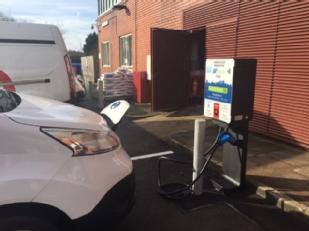 situations, up to 450 kg of emitted carbon dioxide (CO2) or £400 could be saved per vehicle each year.
situations, up to 450 kg of emitted carbon dioxide (CO2) or £400 could be saved per vehicle each year.
Vehicle-to-grid (V2G) can balance the calendar and cycling aging (both of which affect the rate of battery degradation) to optimise the battery condition and improve its health by 8.6 – 12.3% over one-year’s operation, compared to conventional charging alone - equivalent to one extra year of use.
In cost-terms, V2G tariff optimisation can save around £100 per year per charge point on normal business electricity tariffs, with up to £400 saved on a smarter tariff.
If managed to maximise the environmental benefit, nearly half a tonne of annual CO2 emissions can be saved, and significant savings (over 180 kg) can be made even when reducing cost is the main goal.
Chris Rimmer, Infrastructure Strategy lead at Cenex and the project’s lead project manager, said: “Our conclusions show that it is not necessary to trade-off financial, environmental and asset lifetimes when charging Electric Vehicles. Cost, carbon, and conditioning benefits can all be gained when V2G is used intelligently with fleet vehicles.”
Professor Lucelia Rodrigues of the University of Nottingham added “a key challenge for an optimum application of V2G technology is to synchronize the needs and requirements of the users and the energy and transport systems. Our work correlated variables such as user needs, mobility patterns and renewable electricity generation to evolve different possible scenarios for the application of V2G chargers, with a view of maximizing local renewable energy consumption, lowering costs for the user, improving battery life and reducing carbon emissions from the whole system.”
“Our experimental research highlighted the potential to extend battery life by exploiting the unique capability of V2G chargers to both charge and discharge the vehicle battery”, commented Professor James Marco of WMG, University of Warwick. “By careful optimisation of this process and knowing how the battery performance may degrade over time, it is possible to condition the battery to extend its life in a number if situations when compared to conventional methods of vehicle charging.”
The EV-elocity Project was funded by Innovate UK, the Department for Business, Energy and Industrial Strategy, and the Office for Zero Emission Vehicles between September 2018 and January 2022; it was led by Cenex and comprised CrowdCharge, Leeds City Council, Nottingham City Council, University of Nottingham and University of Warwick in a second phase from January 2020.
The project deployed 15 chargepoints across nine sites - including West Midlands Police, Leeds City Council and the University of Nottingham Creative Energy Homes campus. Two of charger from eNovates and Nichicon were managed by a technology-agnostic operating system, demonstrating V2G across the different trial sites within the UK.
The final report presents the findings and lessons learned for future vehicle-to-grid deployment.
Ends
Notes to editors:
The EV-elocity project is part of the Vehicle-to-Grid (V2G) competition, funded by the Department for Business Energy and Industrial Strategy (BEIS) and the Office for Low Emission Vehicles (OLEV), in partnership with Innovate UK, part of UK Research and Innovation.
In January 2018, OLEV and BEIS announced that 21 projects (8 feasibility studies, 5 collaborative research and development projects, and 8 real-world v2g trial projects) were to receive funding of £30m to develop the business proposition and the core technology to support Vehicle 2 Grid deployment in the UK, including its demonstration with large scale trials.
The projects involve more than 50 industrial partners and research organisations from both the Energy and Automotive sector, marking the largest and most diverse activities on V2G in the world, and trialling more than 1,000 vehicles and V2G charger units across UK.
The V2G projects represent a significant step towards the transition to a low carbon transportation and a smart energy system. Allowing EVs to return energy to the Power Grid when parked and plugged for charging, will increase Grid resilience, allow for better exploitation of renewable sources and lower the cost of ownership for EV owners, leading to new business opportunities and clear advantages for EV users and energy consumers.
WMG appoints new Pro-Dean
 Professor Gill Cooke has been appointed as the new Pro-Dean (Education) at WMG, University of Warwick, bringing a wealth of knowledge and experience from both academia and industry.
Professor Gill Cooke has been appointed as the new Pro-Dean (Education) at WMG, University of Warwick, bringing a wealth of knowledge and experience from both academia and industry.
Professor Cooke joins WMG from the School of Engineering, where she was Head of Teaching for almost six years. Prior to that she spent many years in various teaching and management roles at Coventry University including Associate Dean.
Gill left school at 16 to embark on an Engineering Technician Apprenticeship at Dunlop Aviation in Coventry. After completing her apprenticeship Gill qualified as a Quality Engineer working at Dunlop Aviation, Alvis Aerospace, and Jones and Shipman.
At WMG, Gill will develop and oversee the department’s strong education portfolio from undergraduate degrees and degree apprenticeships; to postgraduate degrees; overseas programmes; and professional education courses at the WMG Skills Centre, focusing on both the quality of the provision and the student experience.
Professor Cooke comments: “I’m incredibly passionate about apprenticeships and developing skills. I firmly believe that companies need diverse workforces that represent an inclusive society.
“Industrial demand for new skills and emerging talent is high. Companies are constantly looking to develop solutions to the complex challenges facing society, the economy and the environment. Now more than ever, bridging the gap between academia and industry is crucial in providing a student educational experience that meets industry needs.
“WMG’s approach to bridging this gap resonates strongly with me, and I’m really excited to be joining the team.”
Professor Robin Clark, Dean of WMG comments: “Gill’s appointment is an important step forward for WMG’s Education work. Her student centred and creative approach to learning and teaching will help guide the department as it seeks to enable learners from a diverse range of contexts to realise their aspirations. Gill is also passionate about the development of her colleagues and I am sure they will all benefit from her leadership.”
Find out more about WMG’s education programmes here: Education (warwick.ac.uk)
Researchers develop technology solutions to enhance the safety and efficiency of connected and autonomous vehicles in complex road junctions
Researchers at WMG, University of Warwick have developed technology solutions for safer and more efficient automated driving when navigating complex road junctions such as roundabouts.
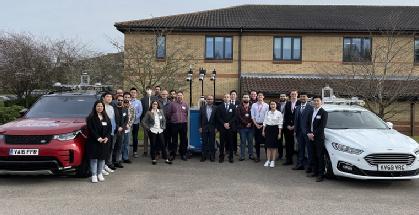 Working in partnership with Jaguar Land Rover, TRL and the University of Surrey, researchers from the Intelligent Vehicles directorate at WMG, University of Warwick have implemented a Proof of Concept demonstrator. This demonstrator focusses on unleashing the power of Edge and Cloud Computing, using a “connected roundabout” at the University of Warwick’s main campus.
Working in partnership with Jaguar Land Rover, TRL and the University of Surrey, researchers from the Intelligent Vehicles directorate at WMG, University of Warwick have implemented a Proof of Concept demonstrator. This demonstrator focusses on unleashing the power of Edge and Cloud Computing, using a “connected roundabout” at the University of Warwick’s main campus.
The Cloud Assisted Real-time Methods for Autonomy (CARMA) project, is part of the £11m TASCC programme funded by the Engineering and Physical Sciences Research Council (EPSRC) and Jaguar Land Rover. Supported by WMG’s Centre High Value Manufacturing Catapult, the CARMA project was established with the intention to create secure and resilient cloud-based platforms to enable safe and robust semi-autonomous functions on future cars in the short term, and with the vision of achieving fully autonomous vehicles.
Professor Mehrdad Dianati, Head of Intelligent Vehicles Research at WMG, University of Warwick said: “We expect autonomous vehicles to be much safer, much more efficient and much more comfortable than human driven vehicles. Unfortunately, with existing sensor and computing technologies, it is difficult and expensive to achieve the level of accuracy and reliability of the perception of the environment that’s expected.”
“CARMA not only demonstrates how these concepts could be implemented in practice, but also highlights what the impact of such technologies might be. This research will help manufacturers, technology developers, policy makers and road operators to make informed decisions on how they will adopt technologies in future road infrastructure, regulations, products and services.”
CARMA researchers installed eight infrastructure cameras, as off-board sensors, at the roundabout to monitor the environment and stream video to a base station called ‘Edge’. Using two-way communication, the Edge processes its own live information with information received from nearby connected vehicles. This processed data containing object, traffic, road layout and lane availability information is broadcast and received by the vehicles.
Dr Graham Lee, Principal Engineer at WMG, University of Warwick, added: “At complex road junctions, the CARMA platform can help enable on-road autonomy by providing additional real time data about the environment through the use of off-board sensors and computing. This gives vehicles the ability to navigate complex road junctions safely and efficiently.”
Dr Saber Fallah, Director of the Connected Autonomous Research Lab at the University of Surrey commented: “This technology enables new business models for the transportation system in alignment with the rise of shared mobility. In addition, autonomous vehicle technology also highlights the potential for how elderly people or disabled people can benefit from the joy of driving from point A to point B safely.”
The testing infrastructure was supported by the Midlands Future Mobility project, Innovate UK and the Centre for Connected and Autonomous Vehicles of the UK Government. The Open Innovation Platform research vehicle used within the project was developed with support from the High Value Manufacturing Catapult and used alongside the CARMA research vehicle provided by JLR.
Over ten follow-on projects have been inspired by CARMA, as technological, regulatory and business challenges are to be overcome before the concept can be deployed on a mass scale. Through the project 23 early career scientists and engineers were trained and three patents were granted along with 40 publications on the work carried out.
WMG hosts visit from the Zambian Government
On Friday (27th May), Professor Robin Clark, Dean of WMG, at the University of Warwick, was pleased to welcome representatives from the Zambian Government.
A total of five delegates led by the Minister of Education, Hon. Douglas Siakalima, enjoyed a tour of WMG’s world-class research and education facilities. Mr Siakalima was joined by Permanent Secretary at the Ministry of Education, Joel Kamoko; Director at the National Science Centre at the Ministry of Education, Dr Benson Banda; Director at the British Council Zambia, David Pardoe; and Acting Zambian High Commissioner to the UK, Patricia Chanda.
The tour began in the International Manufacturing Centre (IMC) where the guests had a chance to see student engineering projects, before Professor Paul Jennings, Pro-Dean (Research) introduced WMG’s 3xD Simulator for Intelligent Vehicles – the world's first immersive, simulated environment for smart and connected vehicles.
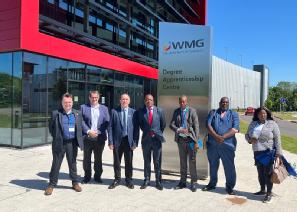 The delegation was then given a guided tour of the Degree Apprenticeship Centre, by Professor Robin Clark. The new Centre helps to bridge the skills gap by providing apprentices with the opportunity to study on degree programmes to develop the skills needed by advanced engineering and manufacturing companies.
The delegation was then given a guided tour of the Degree Apprenticeship Centre, by Professor Robin Clark. The new Centre helps to bridge the skills gap by providing apprentices with the opportunity to study on degree programmes to develop the skills needed by advanced engineering and manufacturing companies.
Professor Robin Clark, Dean of WMG, said: “It was an honour to meet Mr Siakalima and his colleagues, and to demonstrate how we are helping to drive technology, engineering and manufacturing forward through impactful research and innovative approaches to education.
“The ability of an organisation to equip its workforce with relevant skills will largely determine how well it responds to rapidly evolving requirements. By welcoming the Zambian Government, we were able to share best practices around skills provisions with a view to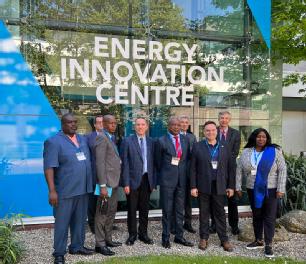 maximising societal, economic and environmental opportunity for future generations.”
maximising societal, economic and environmental opportunity for future generations.”
Finally, the delegation visited the Energy Innovation Centre (EIC) where Chief Engineer, Mark Amor-Segan demonstrated the facilities used to research, develop and test the latest technologies at the forefront of energy storage including electric vehicles. Professor James Marco, Head of the Energy Directorate, and Professor Daniel Branch (Co-Academic Director, Africa in the International Relations and Strategy Group at Warwick) also joined the tour and subsequent discussion.
WMG welcomes Siam Cement Group
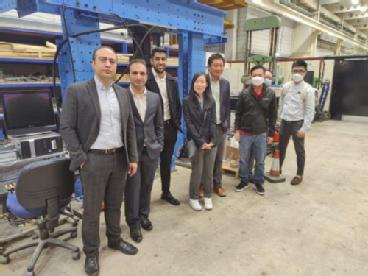 WMG and the School of Engineering at the University of Warwick were pleased to welcome Siam Cement Group (SCG) to campus recently.
WMG and the School of Engineering at the University of Warwick were pleased to welcome Siam Cement Group (SCG) to campus recently.
A senior delegation of directors at SCG, enjoyed an extensive tour of the University’s state-of-the-art facilities including WMG’s Advanced Materials and Manufacturing Centre (AMMC).
SCG, based in Thailand is one of the world’s largest cement and concrete manufacturers. The Group is investing in world-leading technology for construction including Concrete4Change. Concrete4Change is an award-winning R&D start-up, supported by WMG and the School of Engineering, developing net-zero concrete technology.
Dr Sid Pourfalah, Founder and CEO of Concrete4Change, and Honorary Associate Professor at the University of Warwick commented: “We are delighted to host SCG at the University of Warwick. The University has been an invaluable R&D partner in our journey so far, and with SCG now entering into collaboration with Concrete4Change, we can scale our presence in the market and create the true net-zero pathway that the concrete industry desperately needs.”
Read more about the Concrete4Change project here: CO2 consuming concrete technology showcased at COP26 to be tested at University of Warwick - WMG :: News
National Grid calls on support from the construction industry to improve wellbeing for workers
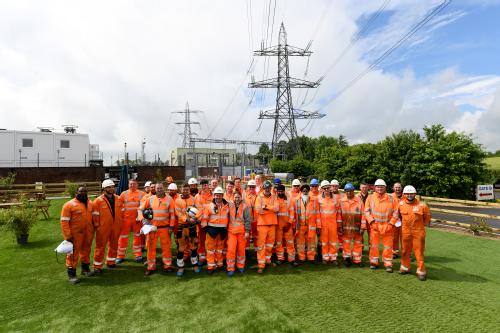 • Research shows 91% of construction workers have felt overwhelmed and 26% have experienced suicidal thoughts*
• Research shows 91% of construction workers have felt overwhelmed and 26% have experienced suicidal thoughts*
• National Grid issues call to join its Health in Construction Consortium to improve wellbeing of workers across the industry.
• National Grid opens new Health Hub at IFA interconnector site to provide wellbeing support for staff and contractors
National Grid is calling on the construction sector to work together to develop an industry-wide approach to improve the mental health and well-being of its workers.
Suicide rates for construction workers in the UK are over three times the national average with over two employees dying by suicide every day.
This highlights that wellbeing initiatives are not reaching the most vulnerable and more needs to be done to improve support and services offered within the sector.
There are a range of factors which make construction employees especially at risk of poor mental health including regular periods of underemployment, extended time spent away from family and friends and high mobility within the workforce. This has only been exacerbated through the pandemic.
According to research by CIOB, some 91% of workers report feeling overwhelmed and 26% have experienced suicidal thoughts. *
National Grid is determined to change this, by establishing a Health in Construction Consortium and leaders have called for supporters from throughout the sector to join the project.
The call to action was made at the official launch of a new on-site Health Hub at the company’s IFA interconnector site in Kent on Thursday. (19th May).
The facility has been specially designed to improve the wellbeing of construction workers and includes a canteen providing heathy meals, recreational space, a garden and a gym as well as a quiet room for prayer and reflection.
Services such as mental health and wellbeing sessions, training and support helplines will be provided by charity Lighthouse Construction Industry Charity which provides vital support for those working within the sector.
The facility, which has been constructed by contractor J Murphy & Sons Limited, is already providing vital services to hundreds of employees working around the clock at the company’s IFA interconnector.
Together with Considerate Constructors Scheme, National Grid has established a Health in Construction Consortium and will be sharing findings from this project across the industry to demonstrate the difference this kind of support can make to workers.
Managing Director of Interconnectors for National Grid, Nicola Medalova, said: “This is an issue that all of us in the construction sector have a responsibility to address. The research shows that something has to change. That’s why we’re looking for representatives from across the sector including small to medium-sized enterprise, large businesses, contractors, and clients, who are passionate about mental health, to be part of the solution. We understand that collaboration and coordination across key stakeholders in the industry will be critical to tackling the mental health crisis in construction. So, whether you are getting started, in development, or leading the way on mental health issues within the sector, we call for your support and ask for you to join us in being an agent for change.”
Considerate Constructors Scheme Chief Executive Amanda Long said: “As an industry, the workforce is at a higher-than-average risk of poor mental health and suicide and we must take action. It is vital that we work together with the construction sector to give all employees access to the support and facilities they need to look after their mental health and wellbeing.”
Chief Executive of Lighthouse Construction Industry Charity Bill Hill said: “We are absolutely delighted to be working with National Grid on this significant issue within our industry. It is so important that we get the message of support to the 'boots on the ground' that we are there for them 24/7. If our workforce don’t know we are there for them we simply can’t help them in crisis. We are delighted to support National Grid’s Wellbeing Hub and I am convinced that this initiative will have a positive impact on workforce wellbeing and ultimately save lives.”
National Grid is working with WMG at the University of Warwick to research the experiences of construction workers using the Health Hub, and the benefits these additional services will have on employee mental wellbeing. The project is being led by Dr Carla Toro, Associate Professor in Digital Healthcare Sciences at WMG.
The research will help the business understand and make recommendations to the sector on the challenges that the construction workforce experience, and the kinds of wellbeing initiatives that could have a positive impact on quality of life and mental health.
Organisations interested in joining the Health in Construction Consortium should contact Alisha Baig by emailing alisha.baig@nationalgrid.com
*Source of Research: 2019 CIOB (The Chartered Institute of Building) Research & Survey: Understanding Mental Health in the Built Environment.
